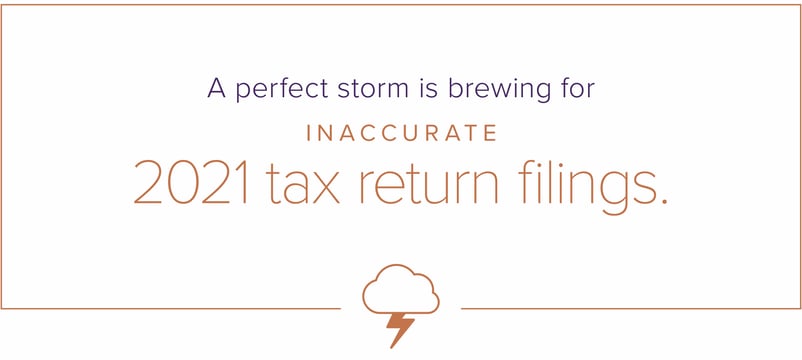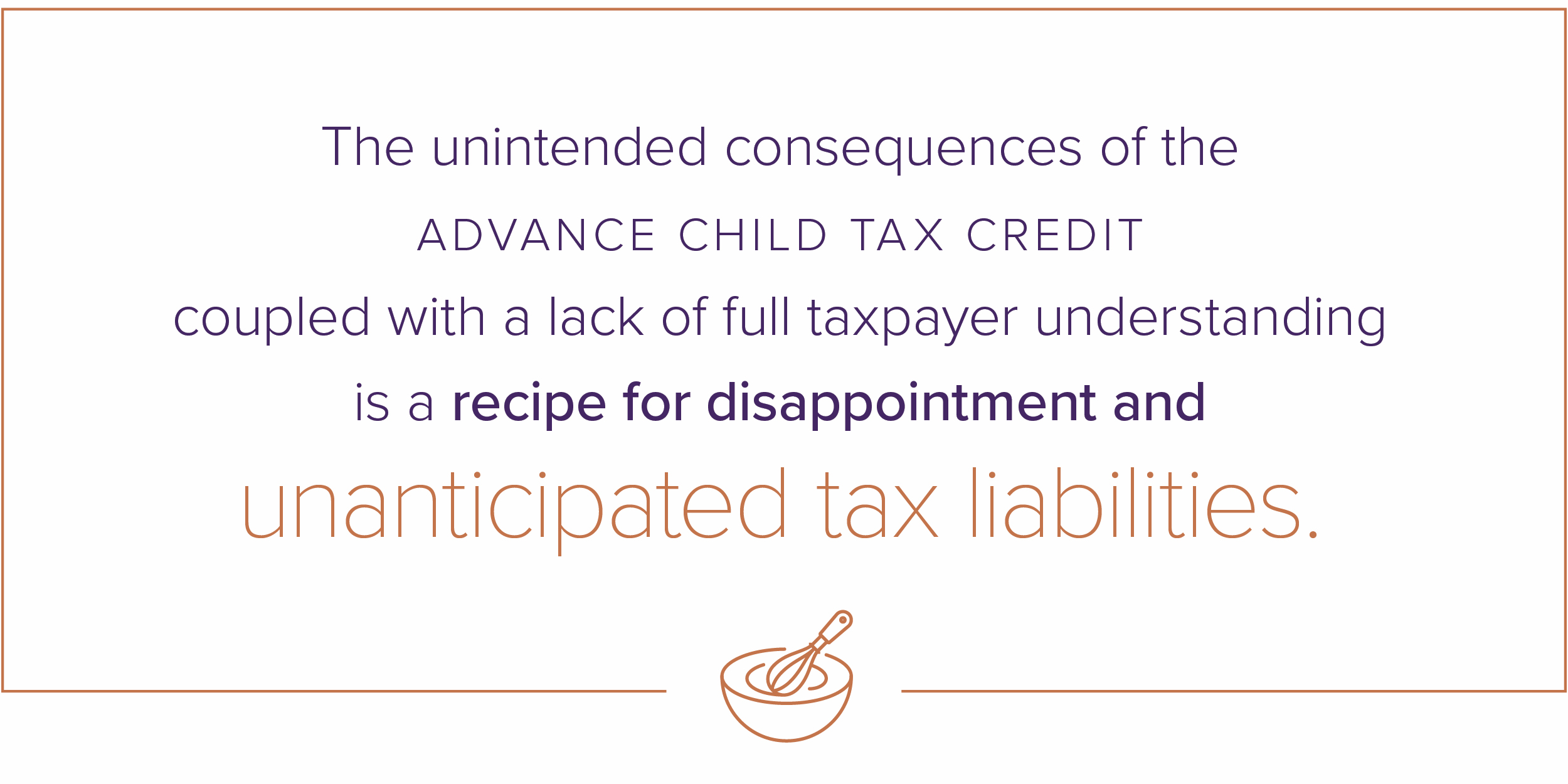
 Under the American Rescue Plan Act passed in March 2021, in response to the ongoing Covid-19 pandemic, the IRS began mailing checks or direct depositing funds for Advance Child Tax Credits (ACTCs) into many taxpayer’s accounts during the period from July 1 through December 31, 2021.
Under the American Rescue Plan Act passed in March 2021, in response to the ongoing Covid-19 pandemic, the IRS began mailing checks or direct depositing funds for Advance Child Tax Credits (ACTCs) into many taxpayer’s accounts during the period from July 1 through December 31, 2021.
While the cash influx was a lifeline to many people going through difficult financial times, it is important to note that the payments did not represent a new social benefit for taxpayers, but rather an early payment of the Child Tax Credit that many people claim on their annual tax returns each year to reduce their tax liability. This small yet significant detail will be a major source of disappointment for many taxpayers in the coming months leading up to the April 18, 2022 filing deadline.
Here’s why:
- First, while the amount of the normal Child Tax Credit ($2,000) was expanded by the American Rescue Plan (to $3,600 for children under age 6 and $3,000 for children under age 18), both the increased benefit amounts and the normal benefit amount are subject to eligibility phase-outs based on a taxpayer’s Adjusted Gross Income (AGI). The IRS determined initial eligibility for the ACTC payments based on 2019 or 2020 tax filings.
Suppose the taxpayer’s 2021 income has increased beyond the full eligibility limits ($150,000 AGI for joint filers for the expanded portion of the credit and $400,000 AGI for the normal portion of the credit). In that case, they may find themselves in a position of having to repay the advanced credit when they file their 2021 returns. After a 2020 filled with layoffs, lockdowns and extreme uncertainty (all leading to lower income levels on a widespread basis), many people returned to work in 2021 and even found more lucrative positions due to workforce constraints. It is likely that those who experienced these significant increases in income levels from 2019-2020 to 2021 will be the most disappointed by the ACTC surprise. - Secondarily, the ACTCs that taxpayers received in 2021 were broken up into small monthly increments and, in many cases, direct deposited into the bank account associated with their most recent tax filing. While a monthly benefit of a few hundred dollars is certainly impactful for many, this benefit may have gone unnoticed for taxpayers near or over the income eligibility levels. As such, their year-end tax planning may not have taken the ACTCs received into account (which reduces the amount otherwise calculated on your return); thus resulting in an unanticipated increase in their tax bill come April. Even for taxpayers who are fully eligible to receive the Child Tax Credit in some capacity, reducing the credit amount that is typically used to reduce their annual tax liability will be an unpleasant surprise.
- Finally, with all of the confusion surrounding eligibility for the ACTCs and determining the amount actually received by taxpayers, a perfect storm is brewing for inaccurate 2021 tax return filings, which will lead to prompt IRS notices and possibly penalties and interest for underpayment of tax liability. Therefore, it is imperative that taxpayers provide their preparers with an accurate account of ACTCs they received during 2021. In early 2022, all taxpayers who received ACTCs should receive correspondence (Letter 6419) from the IRS indicating the aggregate amount of ACTC payments they received. Taxpayers should verify the amount against their bank records and include the IRS form with their tax documentation for the year.
Like most tax changes that occur, the unintended consequences of legislation coupled with a lack of full taxpayer understanding is a recipe for disappointment and unanticipated tax liabilities. Please be aware of this particular situation with the ACTC payments for the 2021 tax year and work closely with your preparer to plan accordingly to avoid any IRS notices or nasty tax surprises this April.
As always, if you need assistance or would like to discuss how this impacts your financials, please contact a Sanderson Wealth Management Financial Adviser.
Disclosure
© 2022 Sanderson Wealth Management LLC. This information is not intended to be and should not be treated as legal, investment, accounting or tax advice and is for informational purposes only. Readers, including professionals, should under no circumstances rely upon this information as a substitute for their own research or for obtaining specific legal, accounting, or tax advice from their own counsel. All information discussed herein is current as of the date appearing in this material and is subject to change at any time without notice. Opinions expressed are those of the author, do not necessarily reflect the opinions of Sanderson Wealth Management, and are subject to change without notice. The information has been obtained from sources believed to be reliable, but its accuracy and interpretation are not guaranteed.
Let’s talk about your future.
Schedule a consultation to learn more about our investment services.
Filter Blog Posts
SUBJECT
- Investment Consulting (160)
- Financial Planning (144)
- Tax Consulting (44)
- Estate & Generational Wealth Planning (15)
- Firm News (11)
- Lessons Earned (11)
- COVID-19: Market Watch (10)
- Community (4)
- Philanthropy (4)
- Business Succession Planning (3)
- Prosper Financial Wellness (3)
- Ukraine: Market Watch (1)
AUTHOR
- Angelo Goodenough
- C. Michael Bader, Esq., MBA, CPA, CIMA®
- Caleb Jennings, MBA, CFP®, CIMA®, AIF®
- Cameron Radziwon, LSSBB
- Debbie Todaro
- Evan Kraft, CFP®, CRPC®
- James Warner, MBA, CPA, CFP®, CIMA®
- Joe Bartelo, CPA
- John Gullo, MBA, CFA, CFP®, CIMA®
- John Sanderson, CPA, CIMA®
- Justin Sanderson, MBA, CFP®, CIMA®
- Karen Nicpon, CPA
- Phil Frattali, CFA
- Regyna Waterhouse
- Sanderson Wealth Management
- Tim Domino, CPA, CFP®
- Tucker Weppner, CFP®
